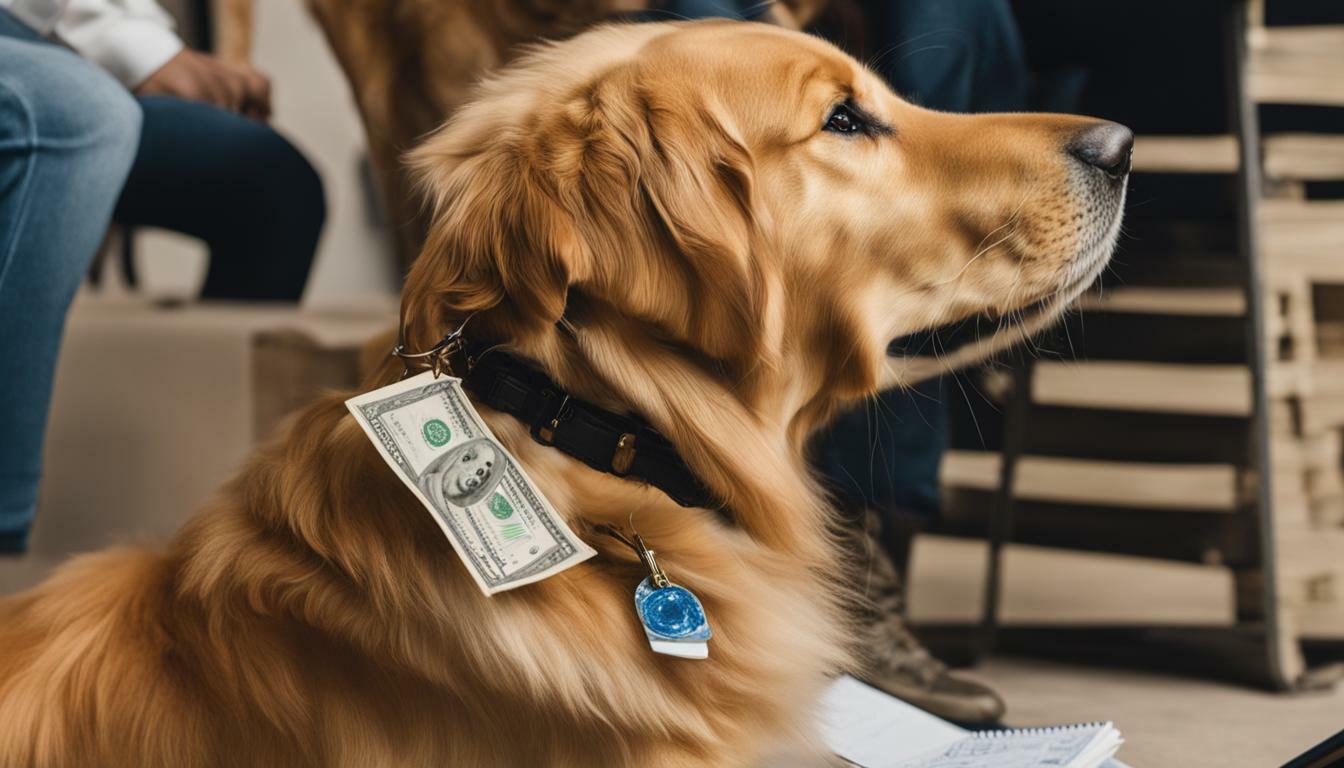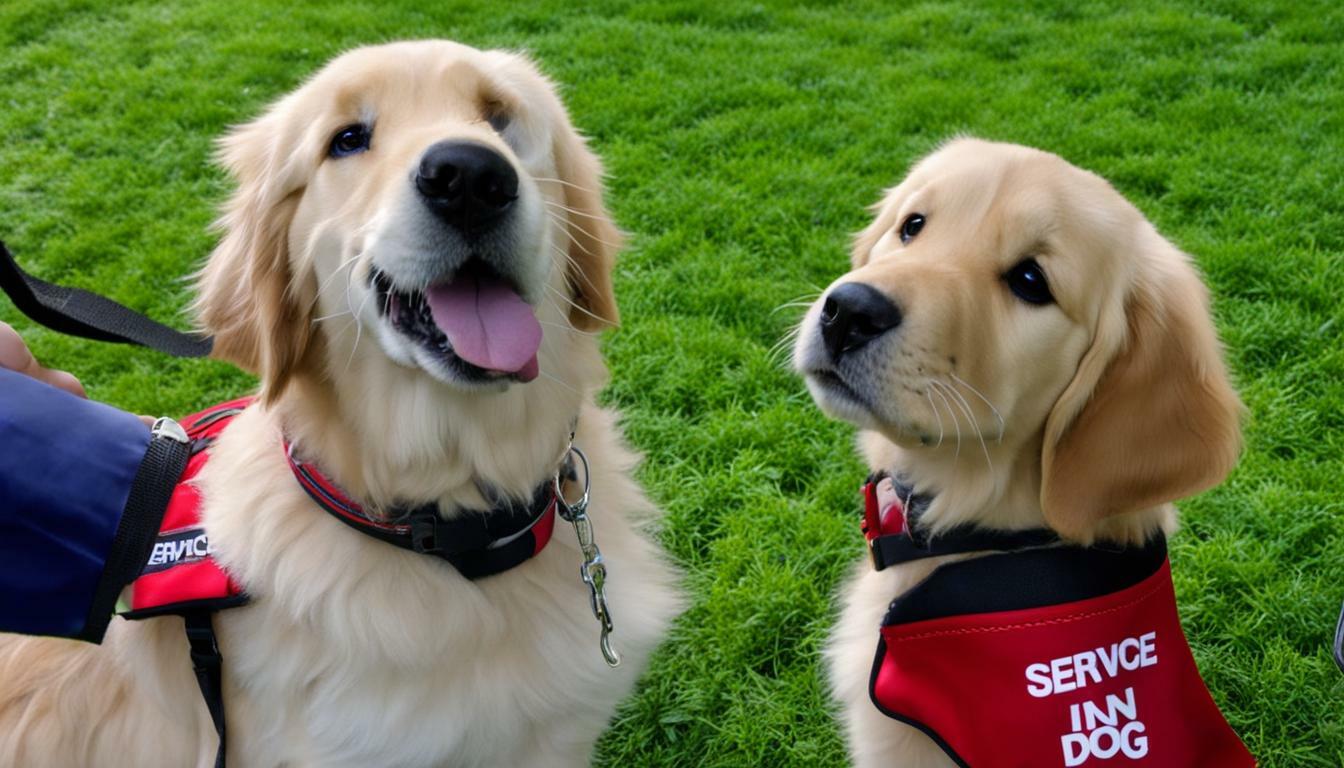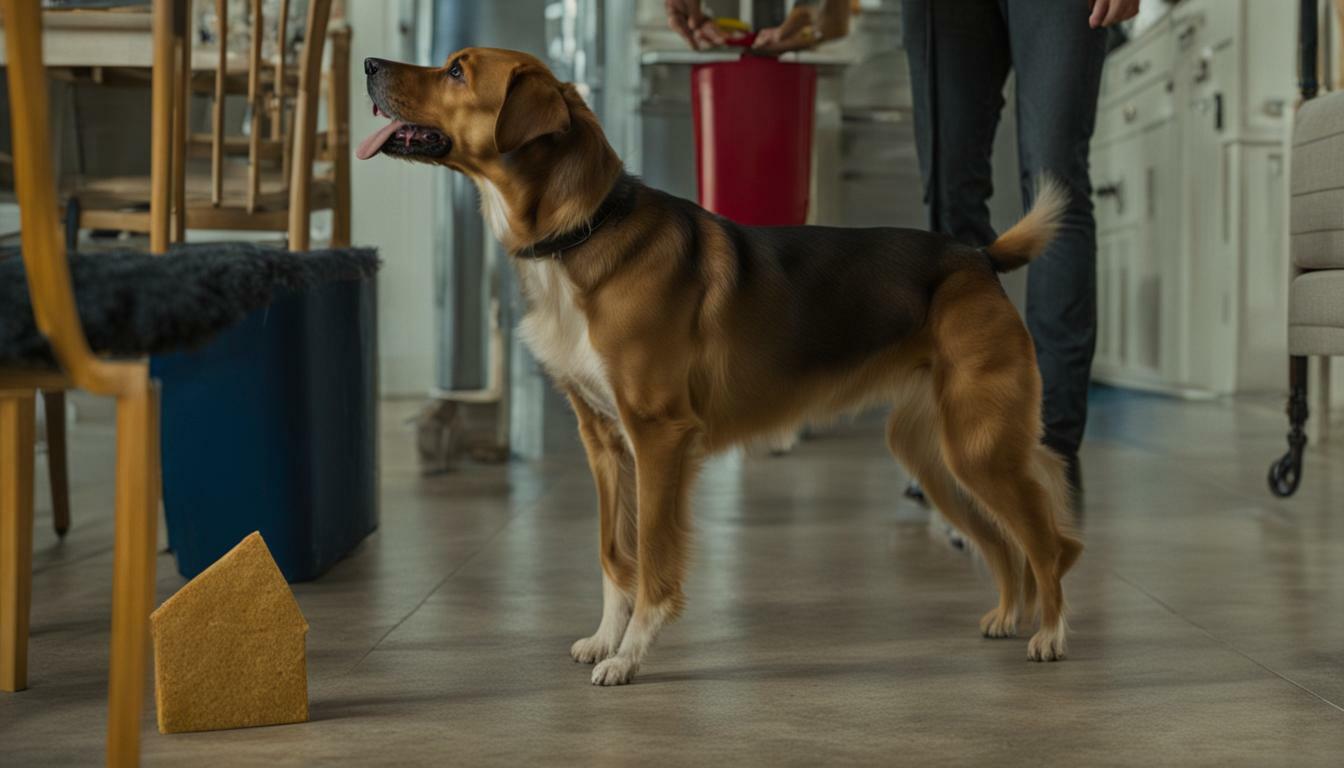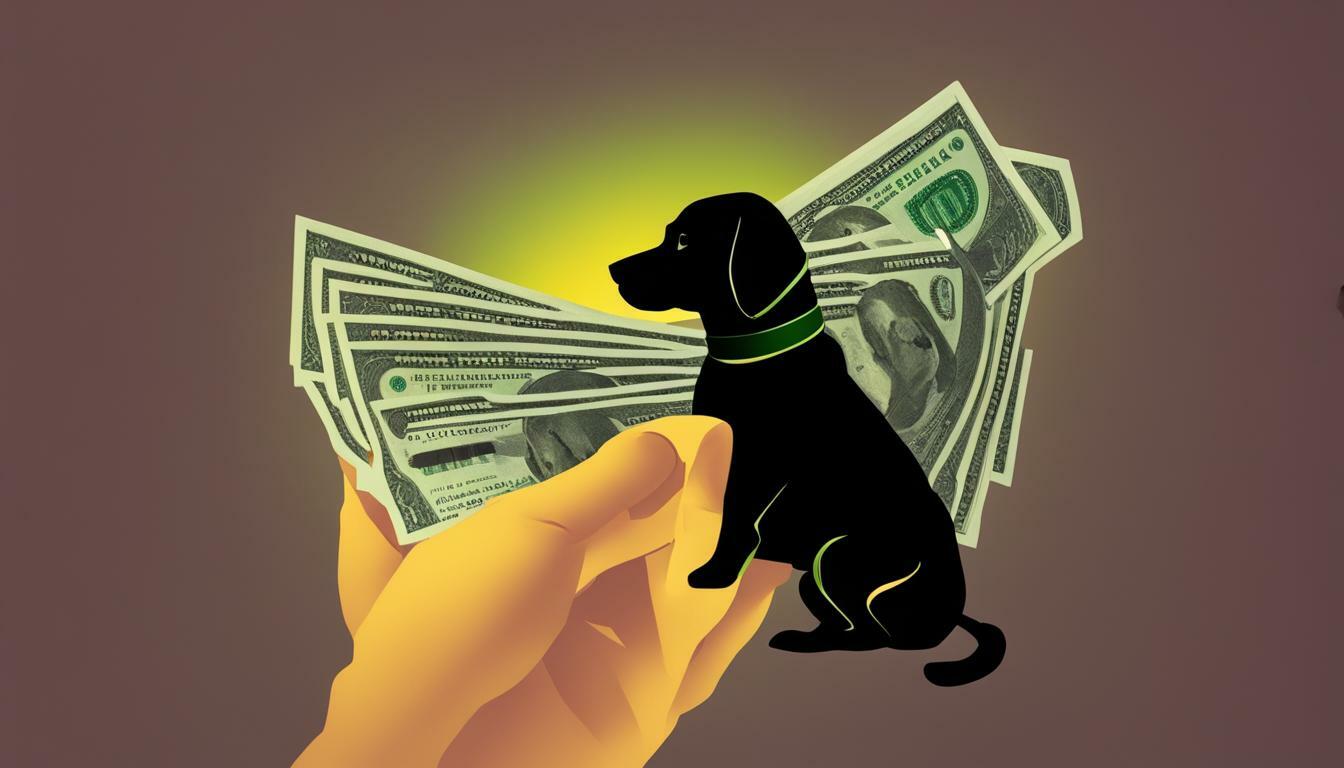Private dog training lessons can be a valuable investment for pet owners seeking to improve their dog’s behavior and obedience. However, with a wide range of dog trainers and pricing options available, it can be challenging to determine how much these services will cost.
In this section, we’ll explore the average prices for private dog training sessions, the factors that influence pricing, and the different pricing models that dog trainers may offer. By understanding the costs associated with private dog training, you can make an informed decision and create a budget that aligns with your training goals.
- The cost of private dog training lessons can vary depending on several factors, including the trainer’s experience, location, and training methods.
- Pricing models can range from hourly rates to package deals, and it’s important to consider the pros and cons of each option.
- Additional costs to be aware of include equipment, travel, and any necessary veterinary care.
- When selecting a private dog trainer, it’s important to consider the trainer’s qualifications, experience, and training methods, as well as their pricing structure.
- While private dog training may come at a higher initial cost, it can provide long-term benefits and potential cost savings in areas such as veterinary bills or damage repair.
Factors Affecting Private Dog Training Prices
Private dog training prices can vary depending on several factors. Understanding these factors can help you determine if you’re getting a fair rate and what to expect from your investment. Here are some of the factors that may influence pricing for private dog training services:
| Factor | Description |
|---|---|
| Experience | The experience and qualifications of the trainer can affect the rate they charge. A more experienced trainer may charge more due to their expertise and proven success. |
| Location | The location of the trainer can also play a role in pricing. Trainers located in metropolitan areas may charge more due to higher living expenses, while trainers in rural areas may charge less. |
| Length of Session | The length of the training session can also affect the price. Longer sessions may cost more due to the increased time and effort required from the trainer. |
| Frequency of Sessions | The number of sessions required can impact pricing. Trainers may offer package deals for multiple sessions, which can be more cost-effective than individual sessions. |
It’s important to keep these factors in mind when comparing private dog training rates. A higher rate may be worth it if it means working with a highly experienced and successful trainer, while a lower rate may be more suitable for those on a budget.
The average cost of private dog training can also vary depending on your location and the trainer’s experience. According to a survey by Thumbtack, the average cost of private dog training in the United States is $140 per session, with prices ranging from $60 to $200 per session.
Keep in mind that these prices are just an estimate, and your specific rate may be different depending on the factors listed above. It’s always a good idea to talk to potential trainers directly about their pricing and what you can expect from their services.

Private dog trainers may offer a variety of pricing models for their services. It’s essential to understand the options available, so you can choose the one that best suits your needs and budget.
Hourly Rates: One of the most common pricing models for private dog training is an hourly rate. Trainers who charge by the hour usually offer flexibility in scheduling and allow clients to book sessions as needed. Hourly rates for private dog training can range from $50 to $150 or more, depending on the trainer’s experience and location.
Package Deals: Some private dog trainers offer discounted rates for clients who purchase a package of training sessions upfront. These packages may include a set number of sessions, or they may be tailored to meet the needs of the client and their dog. Package deals can be an excellent option for clients who want to budget their training costs upfront and ensure they have regular training sessions with their chosen trainer.
| Package Type | Description | Price Range |
|---|---|---|
| Basic Training Package | Includes 5-10 sessions for basic obedience training | $300-$800 |
| Advanced Training Package | Includes 10-15 sessions for advanced obedience training and behavior modification | $800-$1500 |
| Puppy Training Package | Includes 5-10 sessions for socialization, house training, and basic obedience training for puppies | $300-$700 |
Monthly Retainers: Some private dog trainers offer monthly retainers, which enable clients to have access to regular training sessions throughout the month for one flat fee. These retainers can be an excellent option for clients who require ongoing training and support from their chosen trainer.
Travel Fees: Depending on your trainer’s location, they may charge a travel fee to cover the cost of traveling to your home or a specific training location. These fees can vary widely, depending on the distance traveled and the time spent on the road.
By understanding the different pricing models available for private dog training, you can make an informed decision that aligns with your budget and training goals.

Private dog training sessions can vary in cost depending on a range of factors. According to the American Kennel Club, the average cost of a private dog training session is between $45 and $120 per hour. However, some trainers may charge more or less based on their experience, location, and the type of training required.
Training packages are also available and can offer a more cost-effective option. These can range from $250 to $1000 or more, depending on the length of the package and the inclusions.
| Factors Influencing Pricing | Price Range |
|---|---|
| Trainer Experience | $50 – $200 per hour |
| Location | $45 – $150 per hour |
| Training Type | $60 – $200 per hour |
| Training Package | $250 – $1000 or more |
It’s important to note that while finding a dog trainer with competitive prices may be a priority, it’s even more important to select a trainer who is experienced and qualified. Investing in quality private dog training can save you money in the long run by preventing costly mistakes and reducing the risk of behavioral issues that require veterinary intervention.

Ultimately, the cost of private dog training will depend on several factors, including location, experience, and the type of training required. To determine the best options for your dog, consider your budget alongside the value and benefits of professional training. With this information in mind, you can choose a private dog training program that works for both you and your furry friend.
Factors to Consider When Choosing Private Dog Training
Choosing a private dog trainer can be a challenging task. When comparing training options, it’s essential to consider more than just the price. Here are some factors to keep in mind when making your decision:
- Training methods: Each trainer may use different techniques to achieve the desired results. Research and compare different methods to find the one that aligns with your training goals and values.
- Experience: Look for a trainer with ample experience working with dogs similar to yours. Ask for references and verify their credentials to ensure they’re qualified to handle your pet.
- Flexibility: Consider the trainer’s availability and willingness to accommodate your schedule. If you have special requirements or needs, ensure they can cater to them.
- Location: Look for a trainer in close proximity to your home or workplace. This can make it easier to incorporate training sessions into your routine and reduce travel costs.
- Communication: Choose a trainer who communicates effectively with you and your pet. They should be able to explain the training process in a way that’s easy to understand and provide regular updates on progress.
- Reviews: Read reviews and testimonials from previous clients to get an idea of their experiences with the trainer. If possible, ask for firsthand references to ensure the reviews are legitimate.
Remember that finding an affordable private dog trainer doesn’t necessarily mean finding the cheapest option available. Quality training can be a valuable investment in your pet’s future, and selecting the right trainer can ensure you get the best return on your investment.

Private dog training prices may seem steep, but investing in professional training can be an excellent value in the long run. While group classes may be more affordable, they cannot provide the one-on-one attention and tailored training plans of private sessions.
By investing in private dog training, you can address specific behavioral issues and work on training goals at your own pace. This can save you time and money in the long run, as well-behaved dogs are less likely to cause damage or require expensive veterinary care.

Additionally, private training can strengthen the bond between you and your furry companion, leading to a more enjoyable and fulfilling relationship. Plus, with personalized attention from a skilled trainer, you may see quicker progress and more lasting results.
Tips for Finding Affordable Private Dog Training
Private dog training can be a significant investment, but there are ways to find affordable options without sacrificing quality. Here are some tips to consider when seeking affordable private dog training:
- Compare trainer rates: Research and compare rates from different trainers to find one that fits your budget. Keep in mind that the cheapest option may not always be the best option.
- Ask about package deals: Many trainers offer package deals for multiple sessions, which can be more cost-effective in the long run. Don’t be afraid to ask about bundle pricing options.
- Consider group training: Group training sessions can be more affordable than private sessions, and can still provide valuable socialization opportunities for your dog. Look for group classes in your area.
- Work on training at home: Your trainer can provide you with exercises and training techniques to work on at home, which can help reduce the number of sessions needed and save you money in the long run.
- Check for discounts: Many trainers offer discounts for veterans, first responders, or rescue dogs. Ask about any potential discounts that may apply to you.
By taking these steps, you can find affordable private dog training options that still provide quality training for you and your furry friend.
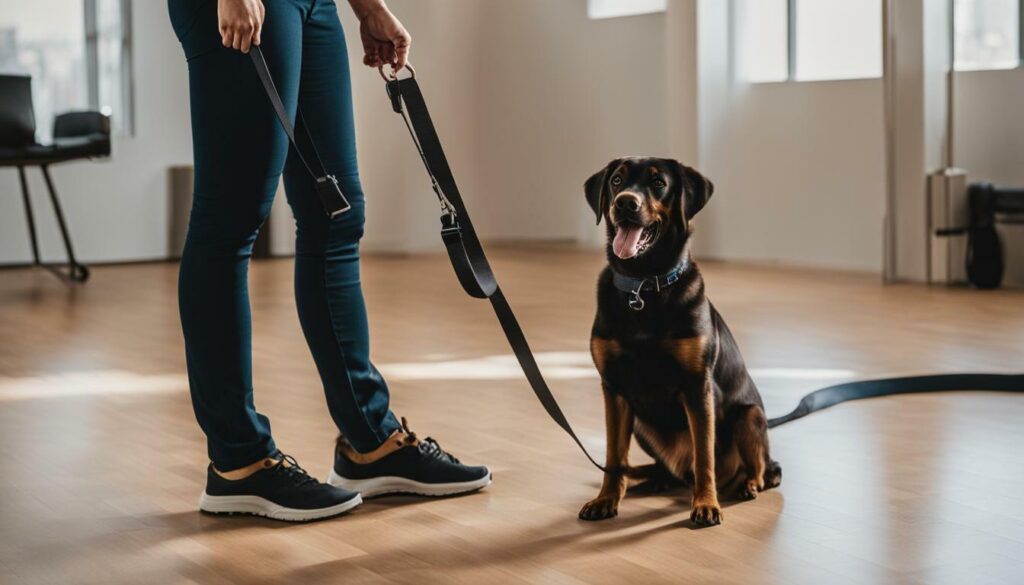
Private dog training prices can vary widely depending on several factors. Trainers consider different variables when determining their rates, such as location, experience, and training methods. As a pet owner, it’s essential to understand the pricing structure of private dog training to make an informed decision about who to hire.
One of the primary factors that can impact private dog training prices is the trainer’s level of experience. Experienced trainers with specialized certifications or years of hands-on experience may charge more than those who are just starting their careers. Additionally, trainers in urban areas with a higher cost of living may also charge more than those in more rural locations.
Another factor that can influence the pricing for private dog training is the methods used by the trainer. Some trainers may use more traditional methods, such as choke chains or prong collars, which may come at a lower cost than those who use positive reinforcement training techniques. Positive reinforcement training can be more time-consuming and require more effort on the trainer’s part, which can lead to higher prices.
Private dog training packages can also be a factor in the pricing structure. These packages may offer a discount for purchasing multiple sessions upfront, which can be more cost-effective for some pet owners. However, it’s important to evaluate the trainer’s qualifications and methods before purchasing a package to ensure you’re getting the best value for your money.
Overall, it’s crucial to understand that private dog training prices are not standardized, and the cost can vary significantly depending on location, experience, training methods, and additional services provided. It’s important to do thorough research and ask potential trainers about their pricing structure to ensure you’re getting a fair value for the services you’re receiving.
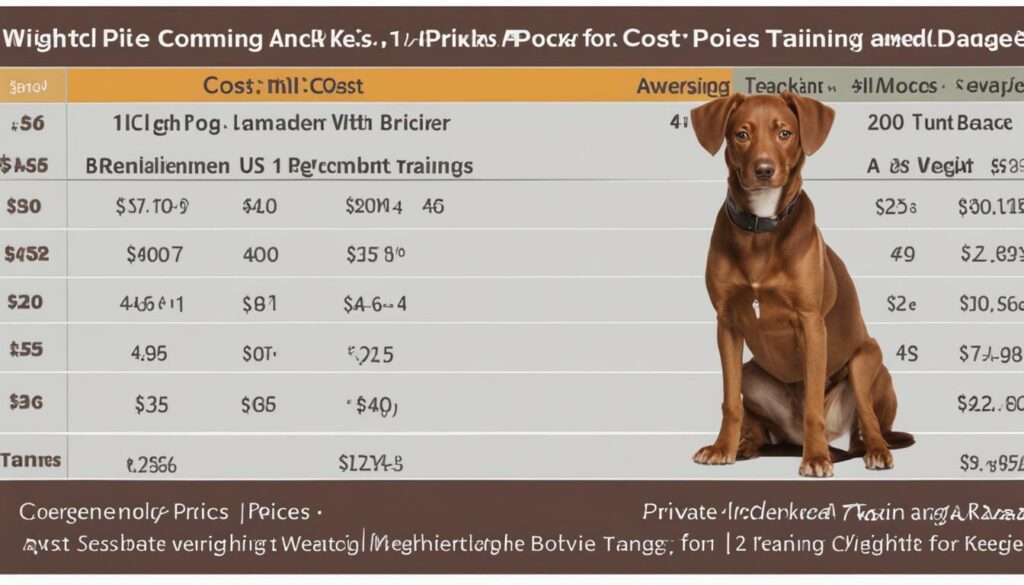
In the next section, we will discuss the important questions to ask potential private dog trainers during the selection process to ensure you’re making an informed decision.
Questions to Ask Potential Private Dog Trainers
Choosing a private dog trainer requires careful consideration of several factors, including their experience, training methods, and pricing. To ensure you make an informed decision, here are some questions to ask potential trainers:
- What is your training philosophy? Understanding a trainer’s approach to dog training is crucial to finding a suitable fit for your dog’s needs and your personal preferences.
- What experience do you have working with dogs? Ask how long they’ve been training dogs, what breeds they have worked with, and what kind of training they specialize in.
- What are your rates for private dog training? While pricing should not be the only determining factor, you’ll want to have a rough idea of what to expect.
- What does a typical private training session look like? Understanding the structure of a training session can help you prepare your dog and get a better idea of what to expect.
- What kind of results have you seen with previous clients? A reputable trainer should be able to provide examples of successful training outcomes.
- Are there any additional costs to be aware of? Ask about any potential expenses for equipment, materials, or travel that are not included in the standard rate.
- What kind of follow-up support do you offer? It’s essential to know if the trainer provides ongoing support after private sessions or if additional sessions will be required.
By asking these questions, you’ll gain valuable insights into a trainer’s qualifications, style, and pricing. Remember that finding the best price for private dog training does not necessarily mean compromising on quality. By selecting a trainer that aligns with your goals and budget, you can ensure the best possible training experience for you and your furry friend.

Private dog training offers a range of benefits over group training classes. One of the most significant advantages is the ability to work one-on-one with a professional trainer. This focused attention allows for a more personalized approach to training, and the trainer can tailor their methods to suit the specific needs and temperament of your dog.
One-on-one training also allows for faster progress as there are no other dogs to compete with for attention or distract from the training. This can lead to quicker results and a more efficient use of your time and money.
Private dog training packages often include individualized training plans that focus on your dog’s unique needs and can address specific problem behaviors. This can lead to long-term behavior changes and improved relationships between you and your furry companion.
Additionally, one-on-one training can be a valuable investment for dogs with special needs, such as those with anxiety or aggression issues. A private setting can provide a safe and controlled environment for these dogs to learn and progress.
Overall, private dog training packages that offer one-on-one training can be a highly effective way to address your dog’s behavior needs and enhance the bond between you and your beloved pet.
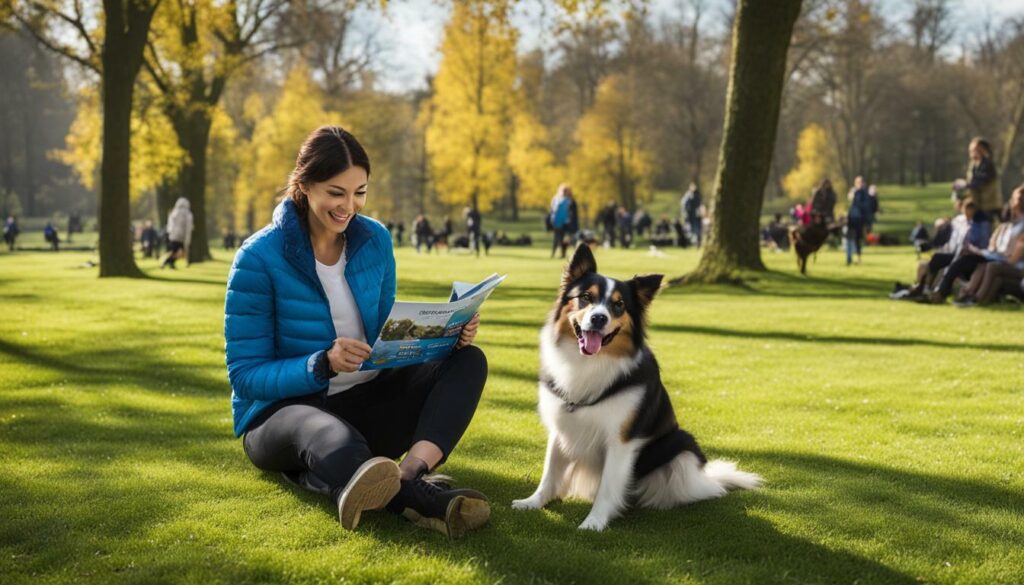
While the cost of private dog training lessons is a significant factor to consider, it’s essential to remember that there may be additional costs associated with the training process. Here are some common expenses to keep in mind:
| Expense | Description |
|---|---|
| Training Equipment | Depending on the training method, you may need to purchase equipment such as leashes, collars, or clickers. These costs can add up quickly, particularly if you require specialized gear. |
| Travel Expenses | If your trainer provides in-home training, they may charge an additional fee for travel expenses. Similarly, if you need to travel to a training facility, you’ll need to factor in transportation costs. |
| Additional Sessions | While most trainers will aim to accomplish your training goals within the set number of sessions, some dogs may require additional training. In this case, you’ll need to consider the cost of extra sessions. |
| Behavioral Issues | If your dog has significant behavioral issues, such as aggression or anxiety, you may need to work with a trainer who specializes in these areas. This can increase the overall cost of private training sessions. |
When selecting a trainer, it’s important to discuss any potential additional costs upfront to ensure you have an accurate understanding of the total cost of private dog training sessions.
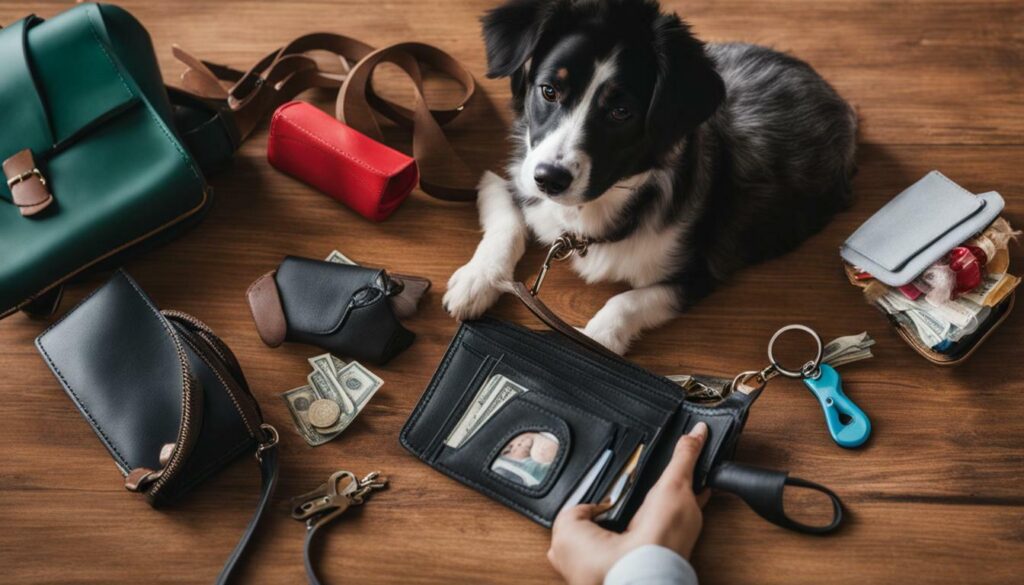
Private dog training may come at a higher cost than group classes, but it’s important to consider the long-term benefits of investing in professional training for your furry friend. Evaluating the return on investment can help you decide if private dog training is worth the cost.
Well-trained dogs can lead to improved behavior, stronger relationships, and potential cost savings. For example, a well-trained dog is less likely to engage in destructive behavior that could result in costly damage to your home or belongings. Additionally, dogs with good obedience skills are often better behaved in public, making outings more enjoyable and potentially safer.
In terms of veterinary bills, well-trained dogs are less likely to require medical attention for behavior-related issues such as anxiety, aggression, or compulsive behavior. This can save you significant amounts of money in the long run.
Overall, private dog training may come at a higher initial cost, but it’s an investment in your dog’s future. By providing them with the skills and training they need to be well-behaved and obedient, you can improve your relationship with your dog and potentially save money on future expenses.
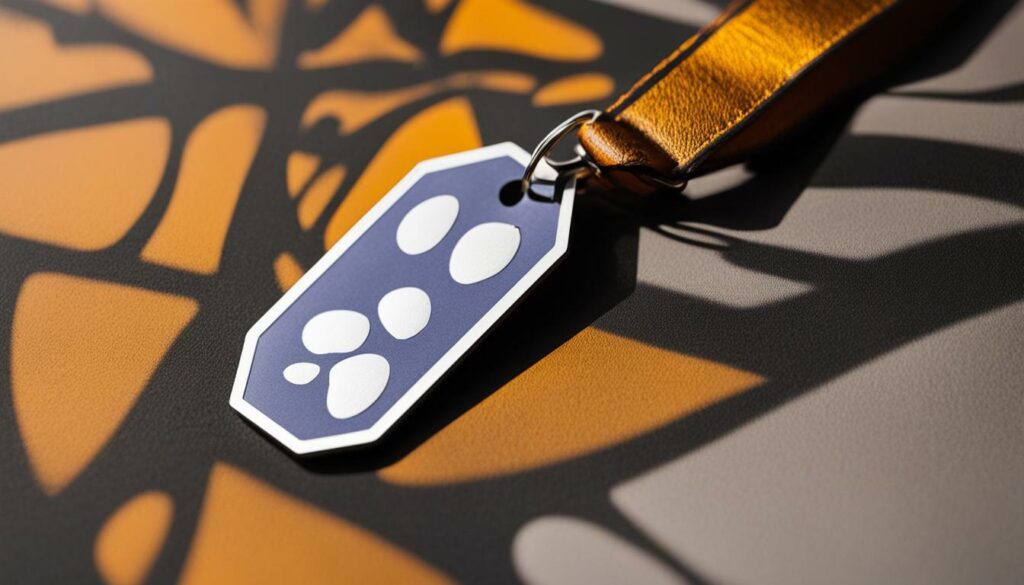
When it comes to selecting the right private dog training program, there are several key factors to keep in mind. While cost is important, it should not be the only consideration.
Experience and Training Methods
One of the most crucial factors to consider is the trainer’s experience and training methods. Look for a trainer who has a proven track record of success in working with dogs similar to yours. Inquire about their training methods, and make sure they align with your preferences and goals for your pet.
Location and Availability
It’s essential to choose a trainer who is conveniently located and has availability that works with your schedule. Consider how far you’re willing to travel for your training sessions and what days and times work best for you and your dog.
Customized Plans and Programs
Every dog is unique and requires individualized attention and training plans. Look for a trainer who offers customized programs that address your dog’s specific needs and behaviors.
Reviews and Recommendations
Research online reviews and ask for recommendations from other pet owners to ensure that the trainer you choose has a positive reputation and a history of delivering effective training.
Ultimately, finding the right private dog training program requires careful consideration and research. By prioritizing factors such as experience, training methods, location, customization, and reputation, you can select a program that best suits your budget, goals, and the needs of your furry friend.
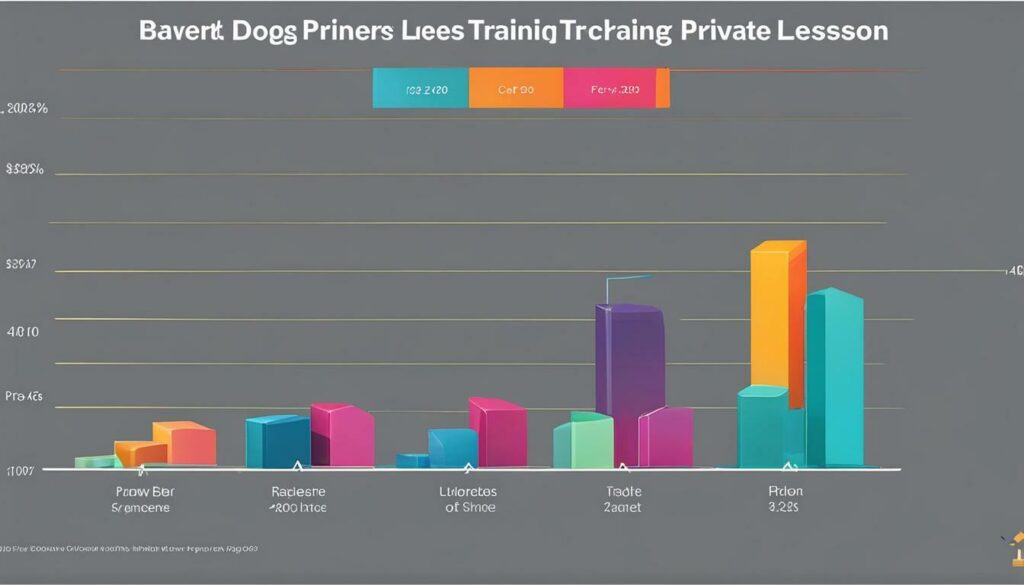
Private dog training lessons can be a valuable investment, but it’s important to understand the costs involved and the factors that can impact pricing. While the average cost of private dog training varies, research and consideration can help you find an option that fits your goals and budget.
When choosing a private dog trainer, it’s important to consider factors beyond just the price. Ask questions, evaluate the training methods, and consider the trainer’s experience to ensure you make an informed decision.
Remember, the benefits of private dog training extend far beyond just price. Investing in professional training can lead to a well-behaved and happy furry companion, which can save you time, money, and frustration in the long run.
Whether you’re looking for an affordable option or seeking out personalized attention, there is a private dog training program out there for you. Keep these tips in mind and choose the right program that aligns with your goals, budget, and the needs of your furry companion.
So, how much are private dog training lessons? The answer depends on a variety of factors, which we’ve explored in detail throughout this article. By keeping these factors in mind, you can make an informed decision that leads to a well-trained and happy furry friend.
FAQ
How much are private dog training lessons?
The cost of private dog training lessons can vary depending on several factors such as location, trainer experience, and the specific training program. It is best to inquire directly with a trainer to get an accurate quote.
What factors can impact private dog training prices?
Several factors can influence the pricing of private dog training, including the trainer’s reputation and experience, the length and intensity of the training program, and any additional services or resources provided.
What are the different pricing models for private dog training?
Dog trainers may offer different pricing models for private training sessions, including hourly rates, package deals, and customized training plans. Each pricing model has its pros and cons, so it’s important to choose the one that best suits your needs and budget.
What is the average cost of private dog training?
The average cost of private dog training can vary, but it typically falls within a range of $50 to $150 per hour. However, prices may be higher or lower depending on your location and the specific services offered by the trainer.
What factors should I consider when choosing private dog training?
When selecting a private dog trainer, it’s important to consider factors such as their qualifications, training methods, experience with your dog’s specific needs, and the overall reputation of the trainer. Price is just one aspect to consider in the decision-making process.
What is the value of private dog training?
Private dog training can offer numerous benefits, including personalized attention, tailored training plans, and faster progress. While it may come at a higher initial cost, the investment can lead to long-term savings by preventing behavioral issues and enhancing your dog’s overall behavior and obedience.
How can I find affordable private dog training?
If you’re on a budget, there are ways to find affordable private dog training. Look for trainers who offer package deals or discounts, consider group training sessions, or inquire about payment plans to make the cost more manageable.
How are private dog training prices structured?
Private dog training prices are typically determined based on factors such as the trainer’s expertise, the duration of the sessions, the number of sessions required, and any additional services or resources provided. Each trainer may have their own pricing structure, so it’s important to inquire about their rates and what is included.
What questions should I ask potential private dog trainers?
When considering a private dog trainer, ask questions about their pricing structure, training methods, experience with your dog’s specific needs, and any certifications or qualifications they hold. This will help you make an informed decision and ensure that the trainer is the right fit for you and your dog.
What are the benefits of one-on-one private dog training?
One-on-one private dog training offers personalized attention, tailored training plans, and faster progress compared to group classes. It allows the trainer to focus specifically on your dog’s needs and can lead to more effective results in a shorter period of time.
What additional costs should I consider in private dog training?
In addition to the cost of private training sessions, you may need to budget for other expenses such as training equipment, treats, and transportation to and from training sessions. It’s important to factor these costs into your overall budget when considering private dog training.
What is the return on investment in private dog training?
Private dog training offers a solid return on investment as it can lead to a well-behaved and obedient dog. This can result in enhanced behavior, improved relationships, and potential cost savings in areas such as veterinary bills or damage repair caused by behavioral issues.
How do I choose the right private dog training program?
Choosing the right private dog training program involves considering your goals, budget, and the specific needs of your dog. Research different trainers, ask for recommendations, and inquire about their training methods to ensure they align with your requirements.
Conclusion
When determining the cost of private dog training, it’s important to consider various factors such as trainer experience, training methods, and the value offered. A balance between cost and quality is essential to ensure you receive effective training that meets your goals and budget.
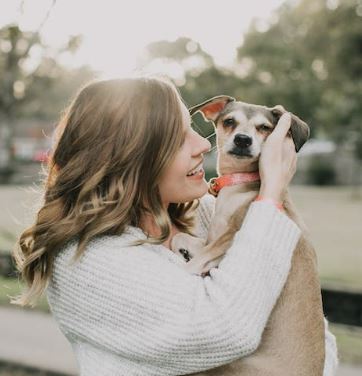
Marissa Delotta, 36, from Dayton, Ohio, is the creative force behind Roverboard.com, a beloved online destination for dog lovers. As a dedicated mom and canine enthusiast, Marissa combines her family experiences with her love for dogs to offer a platform where dog owners can exchange tips, heartwarming stories, and advice. Her website has become a vibrant community for sharing the joys of dog parenting. In her free time, Marissa enjoys exploring dog parks with her family and volunteering at local animal shelters.

